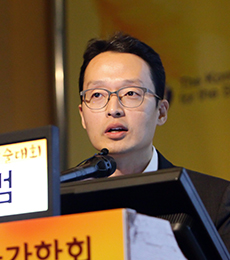New application of AI fine-tunes CRISPR-Cpf1 gene editing technology
Improved Efficiency and Estimated Accuracy of CRISPR-Cpf1 by Using AI Technology
Researchers at the Yonsei University College of Medicine and Seoul National University, as well as other institutions in Seoul, Republic of Korea, have developed a novel AI-based tool for optimizing the accuracy of a popular genome editing strategy, demonstrating the extensive potential for integrating state-of-the-art machine learning with bioinformatics to turbo-charge biologic and medical research.
Building upon their prior research in developing a prototype computational algorithm for predicting the activity of guide sequences for the Cpf1 enzyme that mediates CRISPR genome editing technology, the team led by Professor Hyongbum (Henry) Kim (below) found that using a deep-learning protocol based on a conventional neural network model and incorporating a large training data set significantly improved the predictive accuracy compared to conventional machine learning programs.
 “This represents the first time that AI has been applied at this level to the field of target recognition and genome engineering” comments Professor Kim, a renowned faculty member of the Department of Pharmacology, Yonsei University College of Medicine, Seoul, who believes that this strategy can be further extended to enhance many other fields of research within biology. This is consistent with an overall theme of Professor. Kim’s research to provide genome editing tools for biotechnology and biomedical research and eventually apply these advanced methods as therapeutic modalities for various diseases.
“This represents the first time that AI has been applied at this level to the field of target recognition and genome engineering” comments Professor Kim, a renowned faculty member of the Department of Pharmacology, Yonsei University College of Medicine, Seoul, who believes that this strategy can be further extended to enhance many other fields of research within biology. This is consistent with an overall theme of Professor. Kim’s research to provide genome editing tools for biotechnology and biomedical research and eventually apply these advanced methods as therapeutic modalities for various diseases.
The model was further improved by incorporating known information regarding chromosome accessibility into the algorithm; that is, considering whether a desired target sequence is located in an area of chromosome topography that makes it relatively easy, or difficult, to physically interact with, which constitutes a necessary step of the genome editing process.
The prediction of efficient guide RNAs for a desired target sequence has often been challenging until now. The study in question, titled “Deep learning improves prediction of CRISPR-CPf1 guide RNA activity,” has been published in Nature Biotechnology.
“We anticipate that this AI-based technology for predicting guide RNA activity will become a core technology in the industry as it can markedly accelerate CRISPR-Cpf1 research.” says Professor Kim.
In addition, Professor Kim notes that the technology can also reduce labor and expenses for CRISPR-Cpf1 production, providing greater accessibility to more researchers to stimulate even broader scientific advances.
Moreover, the algorithm, termed Seq-deepCpf1, can be further fine-tuned through the use of specific training sets. In collaboration with co-author Sungroh Yoon, a Stanford-trained faculty member in the Department of Electrical and Computer Engineering, Seoul National University, a web tool enabling accurate prediction of Cpf1 activity in 125 cell lines (for which chromatin accessibility information has previously been determined) is available at http://deepcrispr.info.
Recommended Articles
Professor Hyuk-Jae Chang
Professor Sung-Joo Hwang